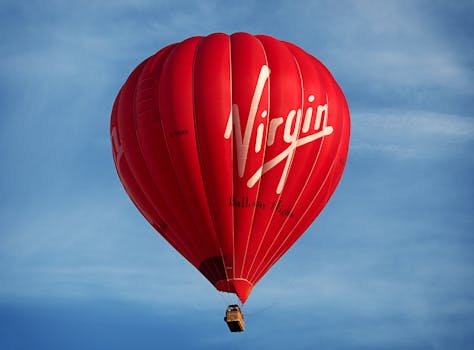Richard Branson: Virgins Journey from Music to Airlines

Richard Branson is a name synonymous with daring ventures and innovative business models. From his early days in the music industry to his groundbreaking foray into airlines, Branson's journey is nothing short of extraordinary. His ability to identify opportunities and turn them into successful enterprises has made him a global icon.
Born in 1950, Branson's entrepreneurial spirit was evident from a young age. He started his first business venture at just 16, launching a magazine called "Student." This early success set the stage for what would become a lifelong pursuit of pushing boundaries and challenging the status quo. Branson's ventures have always been characterized by their boldness and willingness to take risks.
The Virgin brand began with Virgin Records, a record store that Branson opened in 1972. The store quickly gained popularity, leading to the establishment of Virgin Records as a record label. The label signed some of the biggest names in music, including the Sex Pistols and Culture Club. However, Branson's ambitions didn't stop there. He saw potential in diversifying his brand, leading him to explore new industries, including the airline sector.
From Music to Airlines
Branson's leap from the music industry to airlines was nothing short of audacious. In 1984, he launched Virgin Atlantic Airways, challenging the dominance of established carriers like British Airways. Despite skepticism from industry experts, Branson's vision for providing a high-quality flying experience resonated with travelers. His focus on customer service and innovative offerings set Virgin Atlantic apart from its competitors.
Virgin Atlantic's inaugural flight took off from London Gatwick to Newark International Airport, marking the beginning of a new era in air travel. The airline's success was driven by its commitment to excellence and Branson's hands-on approach. He often flew on Virgin Atlantic flights, engaging with passengers and gathering feedback to improve services continually.
Innovations in Air Travel
Under Branson's leadership, Virgin Atlantic introduced several industry-first innovations that redefined air travel standards. The airline was among the first to offer individual seat-back entertainment systems, providing passengers with personalized entertainment options during flights. This innovation quickly became a standard feature across the industry.
Another notable innovation was the introduction of the Upper Class Suite, which offered passengers a luxurious flying experience with fully flat beds, onboard bars, and exclusive lounges. This focus on luxury and comfort helped Virgin Atlantic attract business travelers and high-net-worth individuals.
| Year | Milestone |
|---|---|
| 1984 | Launched Virgin Atlantic Airways |
| 1991 | Introduced individual seat-back entertainment systems |
| 2003 | Launched Upper Class Suite |
| 2019 | Announced plans for supersonic travel |
The Challenges Faced
The journey from music to airlines wasn't without its challenges. Virgin Atlantic faced fierce competition from established airlines and regulatory hurdles. British Airways, in particular, engaged in aggressive tactics to undermine Virgin Atlantic's growth. Branson famously accused British Airways of running a "dirty tricks" campaign against his airline, leading to a highly publicized legal battle.
Despite these challenges, Branson's resilience and determination kept Virgin Atlantic afloat. The airline navigated through economic downturns, fluctuating fuel prices, and other industry challenges by continuously innovating and adapting to changing market conditions.
Diversification and Expansion
Branson's entrepreneurial spirit didn't stop at airlines. He continued to diversify the Virgin brand into various sectors, including telecommunications with Virgin Mobile, space travel with Virgin Galactic, and hospitality with Virgin Hotels. Each venture reflected Branson's commitment to pushing boundaries and exploring new frontiers.
Virgin Galactic, in particular, represents one of Branson's most ambitious projects. Founded in 2004, the company aims to make commercial space travel accessible to the public. Despite numerous setbacks and delays, Branson remains optimistic about the future of space tourism.
The Legacy of Richard Branson
Richard Branson's journey from music to airlines is a testament to his visionary leadership and entrepreneurial spirit. His ability to identify opportunities and turn them into successful businesses has inspired countless entrepreneurs worldwide. Branson's legacy extends beyond his business achievements; he is also known for his philanthropic efforts and advocacy for social causes.
The Virgin Group continues to thrive under Branson's leadership, exploring new opportunities and expanding into emerging markets. From music to airlines and beyond, Richard Branson's impact on various industries is undeniable. His story serves as an inspiration for aspiring entrepreneurs who dare to dream big and challenge conventional wisdom.
A Call to Aspiring Entrepreneurs
Richard Branson's story offers valuable lessons for aspiring entrepreneurs: take risks, embrace innovation, and never shy away from challenges. His journey underscores the importance of perseverance and resilience in achieving success. By following these principles, future business leaders can carve their paths and make significant impacts in their chosen fields.
The world needs more visionaries like Richard Branson who are willing to push boundaries and redefine industries. As we look ahead, we can draw inspiration from his journey and strive to create businesses that not only succeed but also make a positive difference in society.